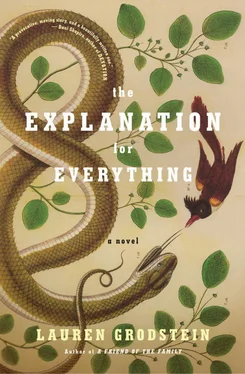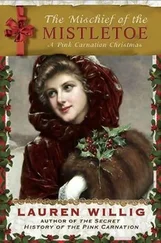“So are we going in?” she asked.
“Don’t be ridiculous,” Andy said. “The water’s freezing.”
“I’m not scared of a little cold water,” Rachel said. “Are you?”
“Guys, don’t even joke,” Andy said. “You’re not going in. It’s probably fifty degrees.”
But Melissa was holding each of their hands.
“You coming, Andy?” she asked.
“You’ll get pneumonia,” he said. “You are not going in.”
The three of them looked at each other and shrugged. “Wash it off,” Melissa said. “Wash it clean.”
And then, with a whoop, the three girls raced across the empty beach and into the frothy surf, Belle’s dress sparkling in the froth, up to their knees in the frigid water. From where he stood, he could hear their giddy screams.
“Dad! Dad, you’ve got to come!”
“Absolutely not!” he yelled, but he knew they couldn’t hear him. He thought, again, of Joyce McGee, and her son, Oliver. Another two years at least. Oliver, who had earned his bachelor’s. Oliver, who was suffering. He had prolonged the boy’s suffering. That was not merciful, nor was it just.
“Dad!” Was that Rachel? Was that Belle? “Dad!”
He walked down to the edge of the water. The touch of surf on his toes felt like ice. How could his daughters jump around in the frosty ocean? But he remembered, they were like seals. They were born in pools of water. They jumped in, they splashed, they washed it off.
He bent his face toward the Atlantic but he did not come out clean.
Reading Rosenblum felt like spending time in the company of a friend, and it felt good to spend the night with a friend’s troubles, distant as they were, instead of his own. As he read, the style of the manuscript emerged as confessional, discursive, not at all like the direct and impatient Religion’s Dangerous Lie or the more scientifically reasoned earlier works. The only thing it read like was a meditation, thoughts circling around other thoughts.
Reading, Andy thought to himself: why didn’t I know Hank was such a religious man?
After my exile from Princeton, I spent a few years traveling the world, knowing but trying not to care that if the Lims won their civil suit, whatever I had in the bank would be theirs. What did I have in the bank, you’re asking? Unfortunately, a tidy bundle. A healthy nest egg. Oh, why be coy? I had just under six million dollars, plus my dusty little house in Princeton, plus the dustier place in Vermont where I liked to retreat, ski in my younger days, write as I got older. These properties were liquidated and the proceeds handed to the Lims in 2007, when the court’s verdict rendered me guilty of criminal harrassment. The Lims got my nice Lexus with the heated seats and my retirement fund and every asset I had ever relied on, celebrated, jetted off to Paris with. However, because I’d had the foresight to spend a lot of what I had when I had it, the Lims weren’t able to touch the trips I’d taken (the Himalayas, Cartagena, Cape Verde, Siem Reap) nor the cigars I’d smoked (Cohiba, Arturo Fuente) nor the ex-wives, whose favors I’d once won with diamond jewelry and fancy dinners. The Lims would never get their greedy hands on my fancy dinners. But they had everything else that had once been mine; I was bankrupt; I was old; I was supposed to be penitent.
I remember that day in 2007 looking in the mirror, and seeing, reflected back, a man much older than the one I had remembered. I had gone fat and bald, my beard had turned mostly white, and when my lawyer said, “Well, listen, Hank, we’ll appeal,” I told him there was no way in hell. I was done, you see. Very much done. I looked like the prophet my former admirers had once thought me and I decided it was time to live like a prophet, like a mystic, like a crazy old hermit in the woods. A man I knew who appreciated my books offered me his cabin on Long Island, on the outskirts of Montauk, a place I had never been. “You’ll like it,” he said. “You’ll learn to fish.” I had fantasies of growing my beard down to my belly and writing my great manifesto. I had fantasies of coming back to Princeton infirm but triumphant. Instead, I moved to this cottage on Montauk, which had not been renovated since the 1950s, and wasn’t really winterized, and didn’t have the right wiring to support a space heater, and I put my books on the bookshelves and decided I would love it. I would learn to love living there in the salty air and the freezing cold. It felt right to be cold.
But what was I affirming? Why did I need to live in this place, broke and alone? Had I done something wrong? Did I feel that I had? The Old Testament (I went to yeshiva as a boy, and it has become impossible lately to rid myself of that decrepit testament) tells the story of Moses dying within sight of Israel, but before he is allowed to finally put his tired feet down on that blessed land. Moses, who has freed the Jewish people from the Pharoah’s shackles, who has led them across the desert, who has engaged in a half-dozen mano-a-mano’s with the Lord our God himself, is not allowed into the Holy Land. He is not allowed to fulfill his life’s dream. This is his punishment, God says, for the sins of vanity and faithlessness. God tells Moses this just before he dies, the crabby bastard. “You are being punished.” So Moses dies in exile, as he lived.
I risk sounding grandiose here, but it seems that I will die like Moses, having seen the promised land of life’s beginnings but never having stepped foot in its truth. Anita offered the promised land of truth, of knowledge, but now she is gone. And I was never the scientist to find this truth for myself. My gift was always to make the most of what other people uncovered. Anita died and took with her the promise of knowledge, and I was left with my vanity and my faithlessness, or my faith in her, unanswered.
(When people ask me what religion offers I tell them a host of lovely parables.)
A few people demanded, after Anita’s death, that I expound about how terrible I felt. Stupidly, I railed against them. I told them to go to hell, to join Anita there. People gasped. But what did they want me to say? Apology has never been my form, even though the truth is that I have never recovered from her death. I am here, in this freezing cold cabin, because she died. And I do not grieve for what her loss cost me materially, truly; I grieve only for her.
Still I do not think her death was my fault—and this is something I’ve interrogated myself upon for many, many days now. For days and months and years. I do not think I did anything wrong, and I can’t imagine having done anything differently.
Of course, Andy thought. Hank Rosenblum never thought of doing anything differently. The first time he saw him in the classroom, smelling like pipe smoke, expounding for hours about the stupidity of those Americans who taught their children to love Jesus, about the idiocy of grammar school teachers in the Bible Belt, about the losers in Kentucky and Texas who wanted to make sure their biology teachers taught that evolution was an unproven idea—that first day he excoriated more than he taught, even as grad student after grad student slipped out of the classroom. Hank lived up to his reputation as a man whose brilliance was outweighed by his crankiness. At the end of the screed, Hank wiped his mouth with both his hands and smiled at the few who were left. “So I have eight of you, huh? Eight true believers.”
Andy looked around. Actually there were only six, including him. It had never occurred to Andy to leave; he’d loved the heat of Hank Rosenblum’s lecturing and hectoring, the way he confirmed everything his mother had ever told him about meddling school boards and idiot parents who threatened to fire her for teaching Darwin. Rosenblum was standing up for reason and what his mother had taught him—standing up tall, with spittle in the corner of his mouth.
Читать дальше












